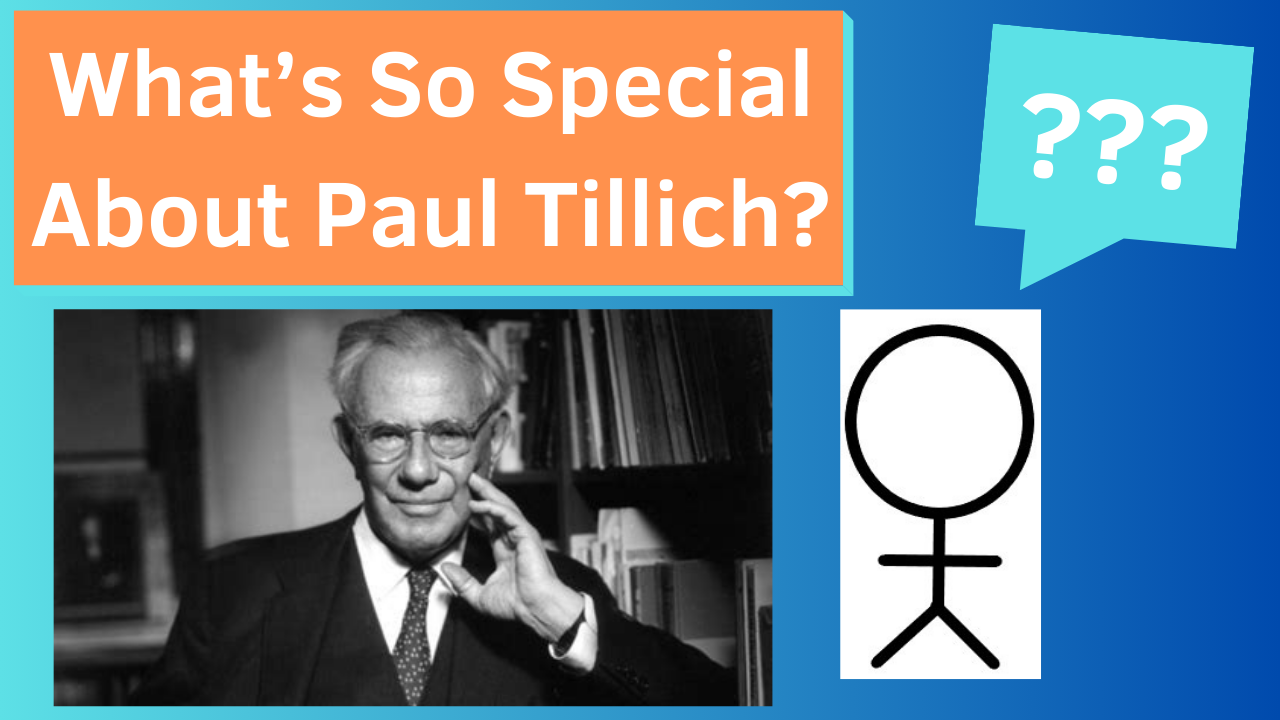11/01/2023 – What's So Special About Paul Tillich?

What’s so special about Paul Tillich? Why have theologians and philosophers been fascinated with this guy’s writings for like seventy years? We’re going to explain where he fits in to the wider theological conversation and highlight some key positive features of his approach. Stick around because you don’t want to miss all the details in this one. This is TenOnReligion.
Hey peeps, it’s Dr. B. with TenOnReligion. If you like religion and philosophy content one thing I really need you to do is to smash that sub button because it really helps out the channel. The transcripts are available at TenOnReligion.com and new episodes are posted about every two weeks, around noon, U.S. Pacific time, so drop me some views.
Okay, here’s the deal. Paul Tillich’s way of framing theology answers some important concerns which drive people from religion in general and Christianity in particular. We’re going to set up the theological options, explain some common stumbling blocks which have caused people to misunderstand Christianity, and then get into the way Tillich overcomes these by highlighting the positive features of his approach. Let’s get started.
There are several major options for theology. What we mean by options are ways of interpreting Christianity in the contemporary world. Prior to the four options though, there is sort of a non-option, so I will start it with the number zero. The non-option is nihilism, or there is no escape. Theology means nothing and there is no good way to explain or interpret its meaning in the contemporary world. The first real option is called the mystical ascent option. It comes from Pseudo-Dionysius. Now, a quick explanation on this weird name. He authored works dated to the late 400’s or early 500’s CE, but the works were written as if he were a person living in the 1st century CE, specifically St. Dionysius the Aeropagite, who was a member on the judicial council in Athens, Greece. Pseudo-Dionysius created an innovative merging of Neoplatonism, a hugely popular philosophy at the time, with Christianity. The idea was that one could engage in a spiritual journey with a slow mystical ascent towards God. The second option is a leap of faith. This comes from the Danish philosopher Søren Kirkegaard. Jesus Christ bridged the gap between an eternal infinite god and a temporal historical human. Since the moment where the infinite and the finite intersect is a paradox, only a leap of faith will get one to the other side. Third is fideism. This is the divine self-revelation of God to humans. It represents the idea of theology from above and is most commonly associated with Karl Barth. Barth’s motivation was insulating theology from Nazi ideology, but later generations probably didn’t understand this and it took on a life of its own, becoming quite popular in evangelical circles in the late 20th century. The fourth option is process theology starting with Whitehead’s process philosophy and then reinterpreted through Charles Hartshorne and John Cobb. This option is a bit complicated and I explained it a little bit two episodes ago in the “Is God Created?” video. So, if you want to learn more check that out. The fifth option comes from Paul Tillich and is the God as “ground of being” option. It is rooted in the idea of existentialism from Martin Heidegger. I have a number of episodes on Tillich, but maybe begin with his Systematic Theology I if you want a good starting point, or even Dynamics of Faith if you want even a simpler version. Now, in looking at the options, zero is absurd. Options one to three are without reason, relying on emotion or faith, which cuts off science and many other forms of knowledge making a person live a dual life – one in the real world and one in their religious world. Option four is with reason, but the metaphysical complexity is a bit overwhelming and seems a bit unnecessary. Option five is with reason where human understanding plays a part in understanding God joining the real world with the religious world – in fact, it’s just one world. I hope this helped you understand the landscape a little bit better. Before taking a look at the positive features of Tillich’s approach, let’s first try to get a grasp on some of the stumbling blocks to Christianity that Tillich was trying to overcome.
There are six, or perhaps seven, academic or theological concerns that many people feel are issues which cause them to have second thoughts about Christianity. The first is inadequate sources. The gospel narratives were written roughly forty to sixty-five years after the death of Jesus and even Paul’s letters were a few decades after as well, so there are no sources which were contemporary to Jesus to corroborate any of the information about his life or death. A second and related issue, is the historical-critical scholarship that has emerged over the past few centuries which calls into question the ability to have any reliable texts. All we have are copies of copies of copies and in quite a few cases scholars do not even know what the original words were in many of the early Christian documents because the materials used to write on just didn’t last very long back then and they’ve disintegrated. The third issue is a claim to uniqueness. Is the word or concept of “Christ” necessary? What did it mean back then and what currency does that claim still have today? The related idea of supercessionism of Judaism has been a problematic idea at best and a genocidal one at worst. Um, yikes! Next, is the idea of the incarnation. It developed long after Jesus was crucified and was a living symbol to the original hearers and readers, but in a world full of various religious traditions, does it still have the same value today? Fifth is the concern of Christian imperialism or colonialism. This has latched onto capitalism and nationalism with much pain and suffering for its targets. A related sixth concern is the language of Christianity as being inherently exclusivistic. This creates a situation of Christian dominion and cuts off any possibility of dialogue with other faith traditions. Seventh, and last, is supernaturalistic literalism. The first century had a very different understanding of the universe, as evidenced by Galileo and many important figures in history. If supernatural literalism were to dominate Christianity, it would cause Christianity to silo itself off from the contemporary use of archeology, natural sciences, sociology, and many other disciplines to better understand the world around us. Again, it creates this dual understanding of the world.
So, let’s talk about some of the positive features of Tillich’s approach. It’s an ontological approach which focuses on the idea of existence. It highlights the symbolic function of language. This is good because it helps us understand how many biblical passages function. It focuses on the human condition. We are temporary, finite, and thus contingent beings. It admits distortions of Christianity and doesn’t shy away from the fact that there are discrepancies in the historical record of early Christianity. It has an emphasis on reason and experience, making it more accessible to all, as opposed to only those who are familiar with the Christian scriptures and its tradition. It uses a method of correlation. Questions of existence arise out of the human situation and are correlated, or explained, through theological answers found in religious symbols. Lastly, there is a clearly explained and intentional anti-literalism attitude towards the biblical documents. As I mentioned a minute or so ago, if we can’t know what the original words were in the historical documents which later became the Bible, and if many of the narratives contain symbolic meanings which were known to the original hearers and readers but unknown to us today, how can those documents be the sole foundation of belief? Interpreting them literally from a person living in any century past the one in which they were written makes them absurd. This is why Tillich emphasizes so much the existential interpretation over the historical one. The history of early Christianity, or any religion for that matter, is fascinating, but times and cultures change as we move forward in history and that’s why religious symbols need to be reinterpreted for each generation to keep them alive. For example, the cross was first an event and then later a symbol. The resurrection was first a symbol in Paul’s letters and then later narrativized as an event in the gospel accounts. Interesting, no?
So, what’s the bottom line here? Tillich doesn’t want to reject science but at the same time doesn’t want the development of science to dominate objective knowledge. This only results in the widespread loss of credibility regarding the grounding of all religion, or, Christianity specifically for Tillich. Religion has to be linked with our existential struggles. Our existential struggles are about what threatens or denies the self, ultimately, our non-being. This is what religion and science share and this is why Tillich’s approach is an ontological approach. Ontology is the study of being and this links God to real existential questions and therefore all being, including humans. All other theological language becomes symbolic, which becomes indirect communication, not literal truths of God. Anything which is preliminary or finite but claims to be ultimate Tillich calls demonic, because it sends people down the wrong path. Did you get all that?
So, what do you think about Paul Tillich’s theological approach? Wow, that was a lot of stuff there. Do you prefer Tillich’s theological approach or do you like one of the other options outlined near the beginning of the video? Leave a comment below and let me know what you think. Until next time, stay curious. If you enjoyed this, support the channel in the link below, please like and share this video and subscribe to this channel. This is TenOnReligion.


